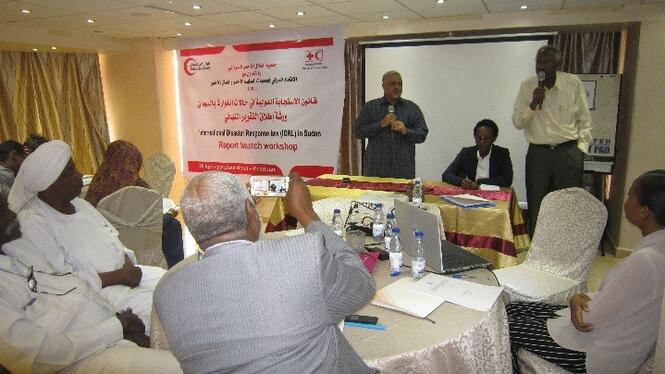
Despite this, Sudan unfortunately does not have a comprehensive disaster risk management framework in place. In addition, there are also gaps regarding the rules and procedures to manage international disaster assistance, if and when required.
The Sudanese Red Crescent (SRC) Society has been advocating for the development of a comprehensive legislative framework for Disaster Risk Management and Disaster Risk Reduction in the country since 2015. Through their role as auxiliary to public authorities in the humanitarian sphere, they have offered technical support to the government agencies that are charged with disaster management in the country. As such, the SRC has sought to bring to light the importance of having a national DRM legislative framework in place.
With the support of the International Federation of Red Cross & Red Crescent Societies (IFRC), the SRC has been carrying out a disaster law study to analyse the existing relevant legal and institutional frameworks in country. The report was developed following comprehensive desk research and recommendations from state level workshops carried out across the country in 2017 and early 2018. The draft report was presented at a one-day workshop on the 25th of April in Khartoum. The workshop gathered together participants from the key government agencies, such as the National Council on Civil Defence, which is the lead government agency tasked with undertaking disaster management in Sudan. The workshop was also attended by various academic institutions as well as Partner National Societies and other international organisations operating in country.
The workshop provided a platform to present the draft report to key stakeholders, as well as incorporate recommendations from the forum on the possible way forward for the improvement of the DM legal and institutional framework. The discussions emphasized the importance of having one centralised national agency charged with the responsibility of disaster management in the country, rather than it being dispersed across different institutions. It was noted that such an agency should have a representative from all relevant national ministries and should work in tandem with key agencies at the state level. To ensure the agency can execute its mandate effectively, it was suggested that the it be placed under the Office of the Vice President or the Ministry of Interior.
A Disaster Law Advocacy plan was also developed during the workshop, which includes activities and plans targeted at the national, state and community levels. The plan is expected to be rolled out by the SRC, with the support of relevant stakeholders, and includes advocating for the development of a national disaster management law which takes into account the recommendations from the research report. The final report of the study is expected to be published in mid-2018.